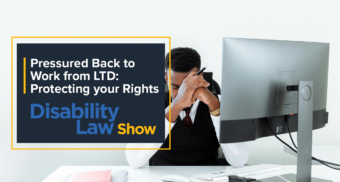Disability Law Show – Season 5 Episode 11
Episode Summary
3 COMMON LTD TERMS YOU NEED TO KNOW AND WHY on Season 5 Episode 11 of the Disability Law Show with disability lawyer and Partner Tamar Agopian.
Watch above to discover the steps you need to take when the insurance company cuts off or denies your long-term disability claim in provinces across Canada, excluding Quebec, on the only disability law show on TV and radio in the country.
Episode Notes
Mediation process and LTD claims
What is the purpose of mediation and why do claimants have to go through it?
- Advantages to mediation: Claimants who have begun the legal process of filing a disability claim should be aware of the importance of mediation. Most jurisdictions across Canada have a mandatory mediation process, and courts have encouraged mediation. Claimants should note that no effort is required from them during the mediation. Disability lawyers are responsible for communicating on behalf of their clients during mediation. In many cases, the claim is resolved during mediation and the future of the claim is also resolved.
Return to work program by the insurer
I’ve been on LTD for a year due to depression. My doctor has suggested I would be able to return to work in the future but did not specify when. As a result, I’ve been put on a return-to-work program by my insurer.
- Returning to work from LTD: Claimants should listen primarily to their treating doctors and medical professionals on whether or not they are ready to return to work. Claimants that return to work due to pressure from the insurance company can experience a regression in their recovery. Doctors should provide clear medical evidence to the insurer and explain that clearance to return to work has not been given.
- Learn More about mental health claims
Depression and LTD
- Learn More about mental health claims
Three common LTD terms you need to know – and why
- Totally disabled: Total disability is the test claimants need to meet in order to qualify for short and long-term disability benefits. This test determines if a claimant’s health prevents them from doing the essential tasks of their position. The term ‘total disability‘ is often misunderstood and claimants are led to believe they must be completely disabled from daily life.
- Own occupation: The majority of long-term disability policies stipulate that in order to qualify for long-term disability benefits in the first two years, claimants have to prove that they are disabled from working in their own occupation. After the first two years, the test to qualify for LTD changes to an inability to work in any occupation where a claimant has the training and skillset.
- Recurrent disability: Most disability policies will contain a section that states that if health issues recur when a claimant returns to work if it occurs during a certain period of time, disability benefits will automatically resume. For claimants who are unsuccessful in returning to work and have a recurring disability, the disability claim should resume.
Told not ‘totally disabled’
I was badly hurt in a slip and fall at home and injured my back. My employer refused to provide accommodations in my job, which only made my injury worse. My attempts to get LTD have failed – they don’t think I’m totally disabled.
- Employment issues and long-term disability: Some disability issues overlap with employment concerns. As a result, it is important when pursuing legal action to speak to a legal team that is well-versed in both disability and employment law. Employers have a duty to accommodate an employee’s medical condition and a refusal to do so can lead to further legal damages. Claimants that have the support of their doctor should focus on their health and allow their legal team to communicate with the disability insurer and employer.
Requested to attend an IME
I’ve been on LTD and CPP Disability for almost 3 years with fibromyalgia and arthritis. My insurer is requesting I attend an IME. My treating doctor says I’ll likely not be able to return to work for years to come. Do I still have to attend?
- Attending an IME: In most disability policies, there are provisions that state if an insurer requires a claimant to attend an independent medical examination, they must attend. A refusal to attend an IME could lead to a breach of contract. Claimants should ensure that their own doctors have supplied their updated medical information to the insurer.
PREVIOUS EPISODE: Disability Law Show S5 E10 – 3 Questions people have when cut off from LTD




